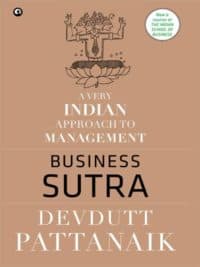RESEARCH: 3.5/5
RELEVANCE: 4/5
WRITING STYLE: 4.5/5
ENTERTAINMENT QUOTIENT: 4/5
I have always known Devdutt Patnaik as a writer on Indian mythology, so when I came across this title – Business Sutra – it was a little surprising.
Having studied management myself, I am always eager to read books on the subject (though I find the regular ones a bit boring, I like the ones which are different and interesting).
This was just the one I would have loved to read; the promise of delicious management cuisine served in an ancient Indian themed restaurant was too tempting to be ignored.
[perfectpullquote align=”left” cite=”” link=”” color=”” class=”” size=””]This book helps us understand the value of Indian philosophy and the relevance of Indian mythology in today’s business management.[/perfectpullquote]Management what we learn today is the brainchild of West, and as any true born would, it carries the genes of the West.
It prides itself on rules, objectivity and targets and whatever it cannot comprehend or change, it brands as chaos.
With the prime motive of removing this chaos from the realms of mankind and the premises of businesses, the Western management school comes to Oriental and Indian cultures and tries to implement the same school of thought that it preaches in the West.
However, what they fail to embark upon and ultimately experience failure from, is the fact that the Indian mindset is different from its western counterpart.
It is shaped by beliefs, philosophy and values embedded deep in our culture and lives.
Business Sutra helps us understand the value of Indian philosophy and the relevance of Indian mythology in today’s business management.
The author takes great pain in describing Jain, Buddhist and Hindu philosophies and linking them to management. The way in which this is done is interesting, informative and very intellectual.
The beautiful illustrations add life to the book and are indeed the best part of it.
The concept is very basic and yet very deep in thought. I also liked the way the author has taken hypothetical examples from everyday work life to make the reader understand the ancient concepts very easily and effectively.
I am also thoroughly impressed with the fact that emphasis has been given to relevance and the reader is driven towards implementation and application rather than mere knowledge.
I was amazed to know that all the knowledge that we have about our mythology and ancient texts is not from the original versions but from the translations done by Western scholars, who have viewed and translated these texts from their western framework of mind.
Business Sutra is definitely a must-read but I believe a few things if implemented, would have greatly enhanced the value of the knowledge imparted by the book.
Firstly, I believe the hypothetical examples could have been a little more detailed, talking about more complex situations rather than extremely basic ones.
Next, I would have liked if more space was dedicated to the description of Indian, Western and Chinese philosophies and the way they are different from each other in terms of managerial decision making.
This was done to an extent, but I wish it was done on a more extensive and elaborate level.
In the end, I wish the author all the best for his future endeavours and sincerely hope that he comes out with more such beautiful works on Indian mythology.
